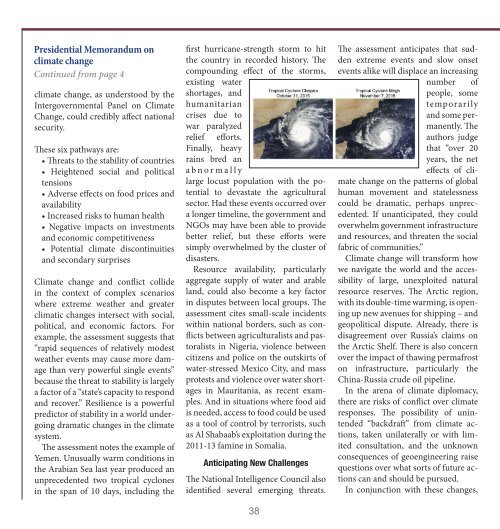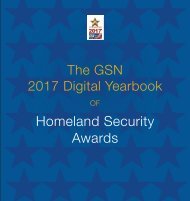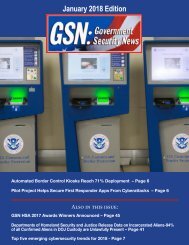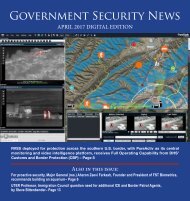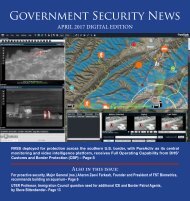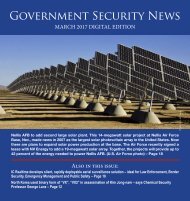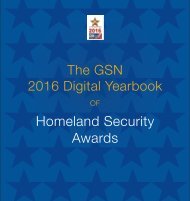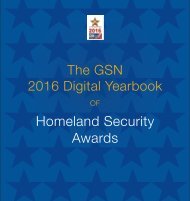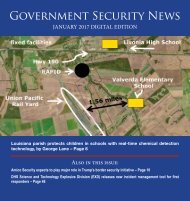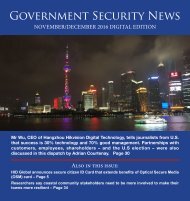GSN_Sep_Final_Yumpu
Create successful ePaper yourself
Turn your PDF publications into a flip-book with our unique Google optimized e-Paper software.
Presidential Memorandum on<br />
climate change<br />
Continued from page 4<br />
climate change, as understood by the<br />
Intergovernmental Panel on Climate<br />
Change, could credibly affect national<br />
security.<br />
These six pathways are:<br />
• Threats to the stability of countries<br />
• Heightened social and political<br />
tensions<br />
• Adverse effects on food prices and<br />
availability<br />
• Increased risks to human health<br />
• Negative impacts on investments<br />
and economic competitiveness<br />
• Potential climate discontinuities<br />
and secondary surprises<br />
Climate change and conflict collide<br />
in the context of complex scenarios<br />
where extreme weather and greater<br />
climatic changes intersect with social,<br />
political, and economic factors. For<br />
example, the assessment suggests that<br />
“rapid sequences of relatively modest<br />
weather events may cause more damage<br />
than very powerful single events”<br />
because the threat to stability is largely<br />
a factor of a “state’s capacity to respond<br />
and recover.” Resilience is a powerful<br />
predictor of stability in a world undergoing<br />
dramatic changes in the climate<br />
system.<br />
The assessment notes the example of<br />
Yemen. Unusually warm conditions in<br />
the Arabian Sea last year produced an<br />
unprecedented two tropical cyclones<br />
in the span of 10 days, including the<br />
first hurricane-strength storm to hit<br />
the country in recorded history. The<br />
compounding effect of the storms,<br />
existing water<br />
shortages, and<br />
humanitarian<br />
crises due to<br />
war paralyzed<br />
relief efforts.<br />
<strong>Final</strong>ly, heavy<br />
rains bred an<br />
abnormally<br />
large locust population with the potential<br />
to devastate the agricultural<br />
sector. Had these events occurred over<br />
a longer timeline, the government and<br />
NGOs may have been able to provide<br />
better relief, but these efforts were<br />
simply overwhelmed by the cluster of<br />
disasters.<br />
Resource availability, particularly<br />
aggregate supply of water and arable<br />
land, could also become a key factor<br />
in disputes between local groups. The<br />
assessment cites small-scale incidents<br />
within national borders, such as conflicts<br />
between agriculturalists and pastoralists<br />
in Nigeria, violence between<br />
citizens and police on the outskirts of<br />
water-stressed Mexico City, and mass<br />
protests and violence over water shortages<br />
in Mauritania, as recent examples.<br />
And in situations where food aid<br />
is needed, access to food could be used<br />
as a tool of control by terrorists, such<br />
as Al Shabaab’s exploitation during the<br />
2011-13 famine in Somalia.<br />
Anticipating New Challenges<br />
The National Intelligence Council also<br />
identified several emerging threats.<br />
38<br />
The assessment anticipates that sudden<br />
extreme events and slow onset<br />
events alike will displace an increasing<br />
number of<br />
people, some<br />
temporarily<br />
and some permanently.<br />
The<br />
authors judge<br />
that “over 20<br />
years, the net<br />
effects of climate<br />
change on the patterns of global<br />
human movement and statelessness<br />
could be dramatic, perhaps unprecedented.<br />
If unanticipated, they could<br />
overwhelm government infrastructure<br />
and resources, and threaten the social<br />
fabric of communities.”<br />
Climate change will transform how<br />
we navigate the world and the accessibility<br />
of large, unexploited natural<br />
resource reserves. The Arctic region,<br />
with its double-time warming, is opening<br />
up new avenues for shipping – and<br />
geopolitical dispute. Already, there is<br />
disagreement over Russia’s claims on<br />
the Arctic Shelf. There is also concern<br />
over the impact of thawing permafrost<br />
on infrastructure, particularly the<br />
China-Russia crude oil pipeline.<br />
In the arena of climate diplomacy,<br />
there are risks of conflict over climate<br />
responses. The possibility of unintended<br />
“backdraft” from climate actions,<br />
taken unilaterally or with limited<br />
consultation, and the unknown<br />
consequences of geoengineering raise<br />
questions over what sorts of future actions<br />
can and should be pursued.<br />
In conjunction with these changes,


